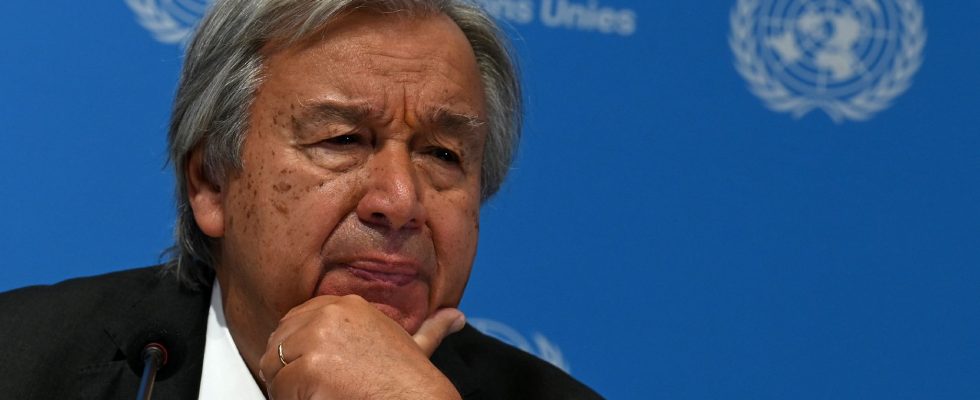The conflict between Israel and Hamas comes to the UN. Its secretary general, Antonio Guterres, provoked the anger of the Jewish state, half-heartedly accusing it of justifying the bloody attack by the Hamas terrorist movement on October 7, while the Palestinian Minister of Foreign Affairs, Riyad al -Maliki, denounced the “inexcusable” inaction of the Security Council, which in recent weeks has exposed its divisions on the Israeli-Palestinian issue.
Act 1: Guterres’ convictions
The UN Secretary General denounced, Tuesday October 24, the “clear violations” of humanitarian law in Gaza and called for an “immediate humanitarian ceasefire”, before a Security Council still divided on the 17th day of the war between Israel and Hamas. “I am deeply concerned about the clear violations of international humanitarian law that we are seeing in Gaza. Let us be clear: no party to an armed conflict is above international humanitarian law,” the UN secretary-general said in the Council chamber is rarely so crowded.
“I repeat my call for an immediate humanitarian ceasefire,” he said. Condemning once again the “horrific and unprecedented terrorist acts of Hamas”, he also noted that these attacks had “not occurred out of context”, once again pleading for a two-state solution.
Act 2: angry, Israel demands his resignation
The UN Secretary General’s comments aroused incomprehension at the top of the Israeli state. The head of Israeli diplomacy, Eli Cohen, thus rejected calls for a ceasefire and proportionality in his country’s response to the Hamas attacks, during which at least 1,400 people were killed and 220 Israelis, foreigners or dual nationals, taken hostage.
“Mr. Secretary General, what world do you live in? Without a doubt, it is not ours,” retorted Foreign Minister Eli Cohen. “How can you conclude a ceasefire agreement with someone who has sworn to kill and destroy your own existence,” he added, before canceling his meeting with Antonio Guterres. For his part, the president of the Yad Vashem Holocaust memorial in Jerusalem accused the UN leader of having “failed the test [portant sur la devise] ‘never again'”.
Israel’s permanent representative to the UN, Gilad Erdan, called on adding that Israel would now refuse to grant visas to UN officials, the British newspaper said THE Guardian. “Because of these remarks, we will refuse to issue visas to UN representatives. We have already refused a visa to the Under-Secretary-General for Humanitarian Affairs, Martin Griffiths. It is time to teach them a lesson,” Gilad said Erdan.
Act 3: Palestine defends the UN Secretary General
For his part, the Palestinian ambassador to the UN, Riyad Mansour, defended Antonio Guterres, denouncing the “ridiculous attacks” carried out against him. “He is the symbol of the United Nations, he has the moral power to be the leader of the United Nations,” he insisted, welcoming his “courageous position” and his trip a few days ago to Rafah, point of passage between Egypt and the Gaza Strip, “to demand aid for the millions of Palestinians under siege”.
Act 4: UN chief says he is “shocked” by the “biased representation” of his comments on Hamas
On Wednesday October 25, the UN Secretary General reacted to strong criticism from Israel’s leaders, asserting that he had not justified the deadly attacks by the Palestinian Islamist movement. “I am shocked at the biased representation by some of my statement yesterday at the Security Council, as if I had justified the terrorist acts of Hamas. This is false. It is the opposite,” Antonio Guterres told the press.
“As I began my remarks yesterday, I clearly said, quote: ‘I unequivocally condemned the horrific and unprecedented terrorist acts of Hamas in Israel on October 7. Nothing can justify the deliberate killing, injuring and kidnapping of civilians, nor the firing of rockets on civilian targets.'” Acknowledging having indeed mentioned the “grievances of the Palestinian people”, he recalled having also insisted on the fact that they could not “justify the appalling attacks of Hamas”. “I believe it was necessary to re-establish the truth, in particular for the victims and their families,” underlined the Secretary General, who denounced the “clear violations of international humanitarian law” in Gaza, without mentioning Israel.
Act 5: The Security Council divided
If Antonio Guterres’ statement caused an outcry in Israel, this controversy also reflects the divisions within the UN Security Council on the Israeli-Palestinian issue. On Wednesday October 25, the institution rejected two competing draft resolutions, Russian and American, on the war between Israel and Hamas.
The text drawn up by the United States advocated “a rapid expansion of aid [pour répondre] to the terrible urgent humanitarian needs of the Palestinians in Gaza”, explained the American ambassador to the United Nations, Linda Thomas-Greenfield. The American resolution was blocked by Russian and Chinese vetoes, receiving 10 votes for, 3 against (Russia, China and United Arab Emirates) and 2 abstentions. The Chinese permanent representative, Zhang Jun, described a document “largely unbalanced, confusing right and wrong”, while the Russian Vassili Nebenzia condemned a text mainly “intended to consolidate the position in the region”. Russia had previously denounced the absence of a clear call for a “ceasefire” in the American text.
A second resolution, prepared by Russia and which called for an immediate “humanitarian ceasefire” and condemned the “abominable attacks of Hamas”, was also rejected, collecting only 4 votes in favor (Russia, China, Arab Emirates United States, Gabon), 2 against (United States and United Kingdom) and 9 abstentions. The United Kingdom indicated that it could not support a text “which, once again, did not recognize Israel’s right to defend itself”, declared the British permanent representative to the United Nations, Barbara Woodward.
